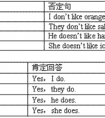用所给单词的适当形式填空1. Millie usually do some______(shop) at the weekend.2. Mark Twin(马克.吐温) is a ______(fun) man.3. I often ______to my friends.(-七年级英语
answer既可作及物动词,又可作不及物动词,常指口头或书面的回答,是一般用语。如:
The old man smiled before he replied to my question.
老人在回答我的问题前笑了笑。
I cannot answer you now. 我现在不能回答你。
How shall I answer? 我该怎样回答?
值得注意的是,answer可引申为“应答”之类的意义,这时不能用reply来代替。如:
answer the door (门铃响了)去开门
answer the telephone 接电话
名词在句中作主语,宾语,介词宾语,宾语补足语,表语以及名词短语作状语。
1.主语:The bagis in the desk.书包在桌子里边。
2.宾语:I washed my clothes yesterday. 昨天我洗了我的衣服。
3.表语:This is a good book. 这是一本好书。
4.宾语补足语We selected him our monitor.我们选他为我们的班长。
5.介词宾语Mary lives with her parents.玛丽和她的父母住在一起。
6.定语:She is a Partymember. 她是一位党员。
名词口诀:
一、人和事物各有名,万千名目可辨清。表示名称即名词,具体抽象有不同。
时间空间和地点,方向位置有专称。主宾定表都可作,名词具有多功能。
二、可数名词不可分,若要分离变性质。不可数名词可分离,一分再分仍原物。
英语名词特殊用法:
1.family指“家庭”时,强调全体;指“家里人”时强调个体,与住房无关
home指“家”,表示同一家庭共同生活的地方,具有感情色彩
Kate has left home for school.可作副词也可作名词,意思是“在家”
house指“住宅”、“住房”The Greens live in a big house.
2.man总称“人”、“人类”,用单数
people泛指“人们”,表示复数概念:People often work in the day.
指“人”的个体,但只表示复数概念:There are five people in my family.
前面加定冠词指“人民”,表示复数概念:Let’s work for the people.
指“民族”时,有单、复数之分:The Chinese people is a hardworking people.
person强调“人”的个体,有单、复数之分:There are five persons in my family.
3.police总称“警察”,表示复数概念:
policeman强调“警察”的个体,有单、复数之分:My father is a policeman.
4.universe指“宇宙万物”,强调物质概念:
When we talk about the universe,we mean the earth, the sun,the moon and many other stars.
space指“太空”、“宇宙空间”,强调空间概念:
Many countries have sent up the satellites into space.
“空间”、“余地”、“空地”:There is no space on the bus.
5.不同国家的人的单复数:
|
名称 |
总称(谓语用复数) |
一个人 |
两个人 |
|
中国人 |
the Chinese |
a Chinese |
two Chinese |
|
瑞士人 |
the Swiss |
a Swiss |
two Swiss |
|
澳大利亚人 |
the Australians |
an Australian |
two Australians |
|
俄国人 |
the Russians |
a Russian |
two Russians |
|
意大利人 |
the Italians |
an Italian |
two Italians |
|
希腊人 |
the Greek |
a Greek |
two Greeks |
|
法国人 |
the French |
a Frenchman |
two Frenchmen |
|
印度人 |
the Indians |
an Indian |
two Indians |
|
加拿大人 |
the Canadians |
a Canadian |
two Canadians |
|
德国人 |
the Germans |
a German |
two Germans |
|
英国人 |
the English |
an Englishman |
two Englishmen |
|
瑞典人 |
the Swedish |
a Swede |
two Swedes |
|
日本人 |
the Japanese |
a Japanese |
two Japanese |
|
美国人 |
the Americans |
a American |
two Americans |
考点名称:物主代词
- 物主代词:
表示所有关系的代词叫做物主代词,也叫人称代词的所有格。
物主代词分为形容词性物主代词和名词性物主代词两种。
物主代词有人称和数的变化。第三人称单数的物主代词还有性别的变化。 物主代词的用法:
物主代词既有表示所属的作用又有指代作用,例如:
John had cut his finger; apparently there was a broken glass on his desk.
约翰割破了手指,显而易见,他桌子上有个破碎的玻璃杯。
物主代词有形容词性(my, your等)和名词性(mine, yours等)两种:
形容词性的物主代词属于限定词。
名词性的物主代词在用法上相当于省略了中心名词的 -'s属格结构,例如:
Jack's cap 意为 The cap is Jack's.
His cap 意为 The cap is his.形容词性物主代词用法:
1. 形容词性物主代词相当于形容词,在句中只能用作定语,后面必须跟名词。名词性物主代词常用来避免和前面已提及的名词重复。
相当于【形容词性物主代词+名词】。例如:
Is that yourbike? 那是你的自行车吗?
My pen is quite different from his.
2. 如果名词前用了形容词性物主代词,就不能再用冠词(a, an, the)、指示代词(this, that, these, those)等修饰词了。例如:
这是他的书桌。This is his desk.
3. 与形容词一起修饰名词时,形容词性物主代词要放在形容词的前面。例如:
his English books他的英语书。
their Chinese friends他们的中国朋友。
- 最新内容
- 相关内容
- 网友推荐
- 图文推荐
| [家长教育] 孩子为什么会和父母感情疏离? (2019-07-14) |
| [教师分享] 给远方姐姐的一封信 (2018-11-07) |
| [教师分享] 伸缩门 (2018-11-07) |
| [教师分享] 回家乡 (2018-11-07) |
| [教师分享] 是风味也是人间 (2018-11-07) |
| [教师分享] 一句格言的启示 (2018-11-07) |
| [教师分享] 无规矩不成方圆 (2018-11-07) |
| [教师分享] 第十届全国教育名家论坛有感(二) (2018-11-07) |
| [教师分享] 贪玩的小狗 (2018-11-07) |
| [教师分享] 未命名文章 (2018-11-07) |

![Which of the following can you probably see in the meeting room? [ ]A. B. C.D. -七年级英语](http://www.00-edu.com/d/file/ks/4/2/dongmingci/2020-01-08/small97361980a56115e1c9237567439904fe1578422951.jpg)

![—Can the boy finish_____ the book in about a week? —I think he can. [ ]A. read B. reading C. to read D. reads -八年级英语](http://www.00-edu.com/d/file/ks/4/2/dongmingci/2020-01-08/smallfa4d713075e249356362fe7392193a301578421751.png)


